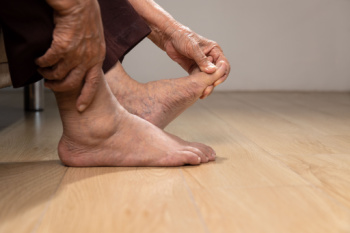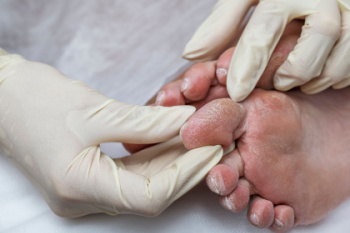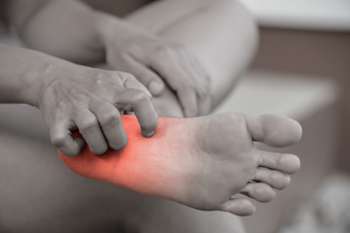Items filtered by date: May 2024
Gout Management Techniques
 Gout is a form of arthritis characterized by sudden, severe attacks of pain, swelling, and redness in the joints. These symptoms often occur in the big toe. Treatment focuses on relieving pain during attacks and preventing future episodes. A podiatrist, or foot doctor, may recommend medications like nonsteroidal anti-inflammatory drugs, colchicine, or corticosteroids to reduce inflammation and pain during acute flare-ups. To manage gout long-term, changes in diet and lifestyle, such as reducing intake of high-purine foods, like red meat and seafood, increasing hydration, and maintaining a healthy weight, are important. A podiatrist can also suggest footwear designed to alleviate pressure on the affected joints, which may involve the use of orthotic devices for extra cushioning and support. Longer-term management techniques may involve the prescription of urate-lowering medications to decrease levels of uric acid in the blood. This helps to prevent the formation of urate crystals that cause gout symptoms. Regular follow-ups with a podiatrist are important to monitor gout symptoms and adjust treatment plans as needed. If you have gout, it is suggested that you consult with a podiatrist for targeted treatment.
Gout is a form of arthritis characterized by sudden, severe attacks of pain, swelling, and redness in the joints. These symptoms often occur in the big toe. Treatment focuses on relieving pain during attacks and preventing future episodes. A podiatrist, or foot doctor, may recommend medications like nonsteroidal anti-inflammatory drugs, colchicine, or corticosteroids to reduce inflammation and pain during acute flare-ups. To manage gout long-term, changes in diet and lifestyle, such as reducing intake of high-purine foods, like red meat and seafood, increasing hydration, and maintaining a healthy weight, are important. A podiatrist can also suggest footwear designed to alleviate pressure on the affected joints, which may involve the use of orthotic devices for extra cushioning and support. Longer-term management techniques may involve the prescription of urate-lowering medications to decrease levels of uric acid in the blood. This helps to prevent the formation of urate crystals that cause gout symptoms. Regular follow-ups with a podiatrist are important to monitor gout symptoms and adjust treatment plans as needed. If you have gout, it is suggested that you consult with a podiatrist for targeted treatment.
Gout is a foot condition that requires certain treatment and care. If you are seeking treatment, contact one of our podiatrists from Toe-tal Family Footcare Associates. Our doctors will treat your foot and ankle needs.
What Is Gout?
Gout is a type of arthritis caused by a buildup of uric acid in the bloodstream. It often develops in the foot, especially the big toe area, although it can manifest in other parts of the body as well. Gout can make walking and standing very painful and is especially common in diabetics and the obese.
People typically get gout because of a poor diet. Genetic predisposition is also a factor. The children of parents who have had gout frequently have a chance of developing it themselves.
Gout can easily be identified by redness and inflammation of the big toe and the surrounding areas of the foot. Other symptoms include extreme fatigue, joint pain, and running high fevers. Sometimes corticosteroid drugs can be prescribed to treat gout, but the best way to combat this disease is to get more exercise and eat a better diet.
If you have any questions please feel free to contact our office located in Vista, CA and Las Vegas, NV . We offer the newest diagnostic and treatment technologies for all your foot and ankle needs.
Managing Diabetic Foot Infections

Over time, uncontrolled diabetes can affect various parts of the body, including the feet. Elevated blood sugars create a favorable environment for infections, particularly in moist areas of the feet. People with diabetes are also at a heightened risk of peripheral neuropathy. This diminishes sensation in the feet and makes it challenging to detect injuries or infections. Factors like poor circulation and impaired wound healing increase the likelihood of foot ulcers and subsequent infections. Treatment of diabetic foot infections varies depending on their type and severity. Antibiotics, wound care, surgical interventions, and optimizing glycemic control are commonly employed strategies. To prevent diabetic foot infections, it is essential to identify and address the risk factors. For that reason, it may be necessary to have regular foot examinations by a podiatrist for early detection and intervention. If you have developed a diabetic foot infection, it is suggested that you schedule an appointment with a podiatrist who can conduct a thorough examination and provide the proper treatment options.
Diabetic foot care is important in preventing foot ailments such as ulcers. If you are suffering from diabetes or have any other concerns about your feet, contact one of our podiatrists from Toe-tal Family Footcare Associates. Our doctors can provide the care you need to keep you pain-free and on your feet.
Diabetic Foot Care
Diabetes affects millions of people every year. The condition can damage blood vessels in many parts of the body, especially the feet. Because of this, taking care of your feet is essential if you have diabetes, and having a podiatrist help monitor your foot health is highly recommended.
The Importance of Caring for Your Feet
- Routinely inspect your feet for bruises or sores.
- Wear socks that fit your feet comfortably.
- Wear comfortable shoes that provide adequate support.
Patients with diabetes should have their doctor monitor their blood levels, as blood sugar levels play such a huge role in diabetic care. Monitoring these levels on a regular basis is highly advised.
It is always best to inform your healthcare professional of any concerns you may have regarding your feet, especially for diabetic patients. Early treatment and routine foot examinations are keys to maintaining proper health, especially because severe complications can arise if proper treatment is not applied.
If you have any questions please feel free to contact our office located in Vista, CA and Las Vegas, NV . We offer the newest diagnostic and treatment technologies for all your foot and ankle needs.
Osteoporosis and Fractures of the Feet

Osteoporosis isn't just about fragile bones. It can impact balance, leading to falls and injuries beyond just the ankle and foot. Even without a specific foot or ankle injury, you might notice pain and swelling in these areas, signaling potential bone issues. Several factors contribute to the likelihood of developing osteoporosis, some within your control and others not. Age is a significant factor, with the risk rising notably for women over 50 and men over 70. Women are more predisposed to osteoporosis and genetics can further increase the risk. While you can't change your age, gender, or genetics, certain lifestyle factors help to reduce your risk. A balanced diet rich in essential nutrients helps maintain bone strength. Hormonal changes, such as low estrogen levels in women and testosterone in men, can affect bone mass and should be monitored. Excessive alcohol consumption and smoking can weaken bones and overall health. Regular exercise, especially weight-bearing activities, can strengthen bones and improve bone density. Even moderate daily exercise, like taking a walk, can make a significant difference in bone health. By understanding these factors and making informed choices, you can take proactive steps to protect your bone health and minimize the risk of osteoporosis-related complications in your feet. If you are experiencing foot or ankle pain that may be connected to osteoporosis, it is suggested that you make an appointment with a podiatrist for an exam and treatment options.
A broken foot requires immediate medical attention and treatment. If you need your feet checked, contact one of our podiatrists from Toe-tal Family Footcare Associates. Our doctors can provide the care you need to keep you pain-free and on your feet.
Broken Foot Causes, Symptoms, and Treatment
A broken foot is caused by one of the bones in the foot typically breaking when bended, crushed, or stretched beyond its natural capabilities. Usually the location of the fracture indicates how the break occurred, whether it was through an object, fall, or any other type of injury.
Common Symptoms of Broken Feet:
- Bruising
- Pain
- Redness
- Swelling
- Blue in color
- Numbness
- Cold
- Misshapen
- Cuts
- Deformities
Those that suspect they have a broken foot shoot seek urgent medical attention where a medical professional could diagnose the severity.
Treatment for broken bones varies depending on the cause, severity and location. Some will require the use of splints, casts or crutches while others could even involve surgery to repair the broken bones. Personal care includes the use of ice and keeping the foot stabilized and elevated.
If you have any questions please feel free to contact our office located in Vista, CA and Las Vegas, NV . We offer the newest diagnostic and treatment technologies for all your foot and ankle needs.
Peripheral Neuropathy and Its Impact on the Feet

Peripheral neuropathy is a condition characterized by damage to the nerves outside the brain and spinal cord. It often results in such symptoms as numbness, tingling, and weakness in the extremities. When it affects the feet, peripheral neuropathy can negatively impact mobility and quality of life. The nerves responsible for sensation and motor function in the feet may become impaired, leading to loss of sensation, burning pain, or hypersensitivity. These symptoms can make it challenging to walk or perform daily activities. Additionally, peripheral neuropathy can cause complications, such as foot ulcers and infections, particularly in individuals with diabetes. Regular foot care and monitoring are essential for preventing serious complications. Managing underlying conditions and adopting lifestyle changes, such as maintaining optimal blood sugar levels and wearing supportive footwear, can help alleviate symptoms and improve overall foot health for individuals with peripheral neuropathy. If you have this condition and your feet are affected, it is suggested that you are under the care of a podiatrist who can help you manage peripheral neuropathy.
Neuropathy
Neuropathy can be a potentially serious condition, especially if it is left undiagnosed. If you have any concerns that you may be experiencing nerve loss in your feet, consult with one of our podiatrists from Toe-tal Family Footcare Associates. Our doctors will assess your condition and provide you with quality foot and ankle treatment for neuropathy.
What Is Neuropathy?
Neuropathy is a condition that leads to damage to the nerves in the body. Peripheral neuropathy, or neuropathy that affects your peripheral nervous system, usually occurs in the feet. Neuropathy can be triggered by a number of different causes. Such causes include diabetes, infections, cancers, disorders, and toxic substances.
Symptoms of Neuropathy Include:
- Numbness
- Sensation loss
- Prickling and tingling sensations
- Throbbing, freezing, burning pains
- Muscle weakness
Those with diabetes are at serious risk due to being unable to feel an ulcer on their feet. Diabetics usually also suffer from poor blood circulation. This can lead to the wound not healing, infections occurring, and the limb may have to be amputated.
Treatment
To treat neuropathy in the foot, podiatrists will first diagnose the cause of the neuropathy. Figuring out the underlying cause of the neuropathy will allow the podiatrist to prescribe the best treatment, whether it be caused by diabetes, toxic substance exposure, infection, etc. If the nerve has not died, then it’s possible that sensation may be able to return to the foot.
Pain medication may be issued for pain. Electrical nerve stimulation can be used to stimulate nerves. If the neuropathy is caused from pressure on the nerves, then surgery may be necessary.
If you have any questions, please feel free to contact our office located in Vista, CA and Las Vegas, NV . We offer the newest diagnostic and treatment technologies for all your foot care needs.
